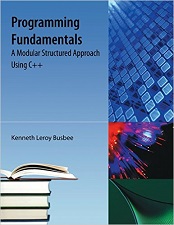
|
FreeComputerBooks.com
Links to Free Computer, Mathematics, Technical Books all over the World
|
|
- Title: Programming Fundamentals: A Modular Structured Approach Using C++
- Author(s) Kenneth Leroy Busbee
- Publisher: Orange Grove Texts Plus (September 24, 2009); eBook (Creative Commons Licensed)
- License(s): Creative Commons Attribution 4.0 License
- Paperback: 314 pages
- eBook: PDF (444 pages), ePub, Kindle, Daisy, Text, DjVu, etc.
- Language: English
- ISBN-10: 1616100656
- ISBN-13: 978-1616100650
- Share This:

|
This book is an introduction to computer programming using C++ as the language for writing programmes, and to solid, fundamental programming principles - including writing structured programmes, looping, data structures and iteration.
The approach of this text is to take learners through a progression of materials in order to develop skills of modular, structured programming. The text was written, for the most part, without consideration of a specific programming language. However, in many cases the C++ language is discussed as part of the explanation of the concept. Often the examples used for C++ are exactly the same for the Java programming language.
About the Authors- Kenneth Leroy Busbee, a faculty member at Houston Community College in Houston, Texas.

- Programming Fundamentals: A Modular Structured Approach Using C++ (Kenneth L. Busbee)
- The Mirror Site (1) - PDF
- The Mirror Site (2) - HTML and PDF
- Book Homepage (PDF, ePub, and Resoureces, etc.)
-
 Fundamentals of Programming C++ (Richard L. Halterman)
Fundamentals of Programming C++ (Richard L. Halterman)
This book teaches the basics of C++ programming in an easy-to-follow style, without assuming previous experience in any other language. It explains fundamental concepts and techniques in greater depth than traditional introductions.
-
 Thinking in C++, Vol 1: Introduction to Standard C++ (2nd Edition)
Thinking in C++, Vol 1: Introduction to Standard C++ (2nd Edition)
Thinking in C++ by Bruce Eckel is the one C++ book you must have if you're doing serious development with C++. The book filled with expert advice and written in a patient, knowledgeable style.
-
 C++ in Action: Industrial Strength Programming Techniques
C++ in Action: Industrial Strength Programming Techniques
This is a modern guide to using C++ langugage, including how to apply it to Windows programming. Shows how to write programs for programmers, not computers. It teaches the programmer how to write small, fast, reliable, and scalable programs.
-
 Industrial Strength C++: Rules and Recommendations
Industrial Strength C++: Rules and Recommendations
This book presents proven strategies for using and programming in the C++ object-oriented language in the form of easy-to-follow lists of rules and recommendations. It covers naming conventions, code organization, resource management, etc.
-
 C++ Programming for Scientists (Roldan Pozo, et at)
C++ Programming for Scientists (Roldan Pozo, et at)
This book is designed specifically for today's Scientists, Engineers and Mathematicians with a wealth of new applications and examples taken from real situations involving electrical and structural engineering, fluid mechanics, mathematics, etc.
-
 Elements of Programming (Alexander Stepanov, et al)
Elements of Programming (Alexander Stepanov, et al)
The book shows that algorithms implemented in a real programming language, such as C++, can operate in the most general mathematical setting. For example, the fast exponentiation algorithm is defined to work with any associative operation.
-
 Data Structures and Algorithm Analysis in C++, 3rd Edition
Data Structures and Algorithm Analysis in C++, 3rd Edition
A comprehensive treatment focusing on the creation of efficient data structures and algorithms, using C++, this text explains how to select or design the data structure best suited to specific problems.
-
 Programming Persistent Memory: A Comprehensive Guide
Programming Persistent Memory: A Comprehensive Guide
The book explains fundamental concepts, provides an introduction to Persistent Memory programming APIs for C, C++, JavaScript, and other languages, discusses RMDA with persistent memory; reviews security features; and presents many examples.
-
 Principles of Algorithmic Problem Solving using C++
Principles of Algorithmic Problem Solving using C++
The algorithmic approach to solving problems in computer technology is an essential tool. This book presents a readable, entertaining, and energetic book that will motivate and challenge students to open their minds to the algorithmic nature of problem solving.
-
 Scientific Programming and Computer Architecture
Scientific Programming and Computer Architecture
The book digs into linkers, compilers, operating systems, and computer architecture to understand how the different parts of the computer interact with programs. It begins with a review of C/C++ and explanations of how libraries, linkers, and Makefiles work.
-
 The Rook's Guide to C++ (Jeremy A. Hansen)
The Rook's Guide to C++ (Jeremy A. Hansen)
This textbook written by Norwich University students and faculty aims to provide an introduction to the C++ programming language. This step-by-step book is ideal for first-time programmers or those new to C++.
-
 C++ Annotations: An Extensive Tutorial (Frank B. Brokken)
C++ Annotations: An Extensive Tutorial (Frank B. Brokken)
This book covers C++11 and is intended for knowledgeable users of C (or any other language using a C-like grammar, like Perl or Java) who would like to know more about, or make the transition to, C++.
-
 C++ Essentials (Sharam Hekmat)
C++ Essentials (Sharam Hekmat)
This book introduces C++ as an object-oriented programming language. It presents the basics of C++ in the context of procedural, generic, object-based, and object-oriented. No previous knowledge of C or any other programming language is assumed.
-
 The Boost C++ Libraries (Boris Schaling)
The Boost C++ Libraries (Boris Schaling)
This book is an introduction to the Boost C++ Libraries. The Boost C++ Libraries complement the C++ standard and add many practical tools that can be of use to any C++ developer and in any C++ project.





